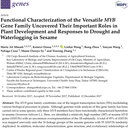
Marie Ali MmadiOil Crops Research Institute · Department of Agriculture
Marie Ali Mmadi
About
22
Publications
9,670
Reads
How we measure 'reads'
A 'read' is counted each time someone views a publication summary (such as the title, abstract, and list of authors), clicks on a figure, or views or downloads the full-text. Learn more
525
Citations
Publications
Publications (22)
Developing crops with improved root system is crucial in current global warming scenario. Underexploited crops are valuable reservoirs of unique genes that can be harnessed for the improvement of major crops. In this study, we performed genome-wide association studies on seven root traits in sesame (Sesamum indicum L.) and uncovered 409 significant...
Major crops are generally sensitive to waterlogging, but our limited understanding of the waterlogging gene regulatory network hinders the efforts to develop waterlogging-tolerant cultivars. We generated high-resolution temporal transcriptome data from root of two contrasting sesame genotypes over a 48 h period waterlogging and drainage treatments....
An increasing number of candidate genes related to abiotic stress tolerance are being discovered and proposed to improve the existing cultivars of the high oil-bearing crop sesame (Sesamum indicum L.). However, the in planta functional validation of these genes is remarkably lacking. In this study, we cloned a novel sesame R2-R3 MYB gene SiMYB75 wh...
An increasing number of candidate genes related to abiotic stress tolerance are being discovered and proposed to improve the existing cultivars of the high oil-bearing crop sesame (Sesamum indicum L.). However, the in planta functional validation of these genes is remarkably lacking. In this study, we cloned a novel sesame R2-R3 MYB gene SiMYB75 wh...
Sesame is naturally adapted to arid environments but highly susceptible to waterlogging stress. A few hours of waterlogging (lasting over 36 h) are detrimental to the crop growth, yield and survival. To better understand the molecular mechanisms underlying sesame responses to waterlogging and recovery, it is essential to design a high-resolution ti...
Sesame is a source of a healthy vegetable oil, attracting a growing interest worldwide. Abiotic stresses have devastating effects on sesame yield; hence, studies have been performed to understand sesame molecular responses to abiotic stresses, but the core abiotic stress-responsive genes (CARG) that the plant reuses in response to an array of envir...
Unlike most of the important food crops, sesame can survive drought but severe and repeated drought episodes, especially occurring during the reproductive stage, significantly curtail the productivity of this high oil crop. Genome‐wide association study was conducted for traits related to drought tolerance using 400 diverse sesame accessions, inclu...
Basic leucine zipper (bZIP) gene family is one of the largest transcription factor families in plants, and members of this family play important roles in multiple biological processes such as light signaling, seed maturation, flower development as well as abiotic and biotic stress responses. Nonetheless, genome-wide comprehensive analysis of the bZ...
Numbers of known stress-related cis-elements in the promoter regions of SibZIP genes.
(XLSX)
The protein interaction relationship in the bZIP-mediated interaction network in Arabidopsis.
(XLSX)
Segmentally duplicated SibZIPs on sesame linkage groups.
Grey lines indicated collinear blocks in whole sesame genome, and red lines indicated duplicated SibZIP gene pairs.
(TIF)
Sequence logos for conserved motifs identified in SibZIPs by MEME analysis.
(TIF)
Expression profiles of SibZIP genes under osmotic, salt and cold.
Two-week-old seedlings were subjected to osmotic (15% PEG 6000), salt (150 mM NaCl), and cold (4°C) stresses. Relative expression levels of SibZIP genes were analyzed by qPCR, using sesame SiH3.3 gene as the internal control. Error bars indicate standard deviations (SD) based on thre...
Characteristics of bZIP transcription factors in sesame.
(XLSX)
Segmental duplicated bZIP gene pairs within sesame genome.
(XLSX)
Phylogeny-based functional prediction of SibZIP genes based on Arabidopsis functional groups.
(XLSX)
The homologous genes in sesame from the interaction network.
(XLSX)
List of primers used for quantitative real-time RT-PCR analysis.
(XLSX)
DNA methylation is a heritable epigenetic mechanism that participates in gene regulation under abiotic stresses in plants. Sesame (Sesamum indicum L.) is typically considered a drought-tolerant crop but highly susceptible to waterlogging, a property attributed to its presumed origin in Africa or India. The understanding of the DNA methylation patte...
The MYB gene family constitutes one of the largest transcription factors (TFs) modulating various biological processes in plants. Although genome-wide analysis of this gene family has been carried out in some species, only three MYB members have been functionally characterized heretofore in sesame (Sesamum indicum L.). Here, we identified a relativ...
Sesame (Sesamum indicum L.) is one of the oldest oilseed crops widely grown in Africa and Asia for its high-quality nutritional seeds. It is well adapted to harsh environments and constitutes an alternative cash crop for smallholders in developing countries. Despite its economic and nutritional importance, sesame is considered as an orphan crop bec...























































